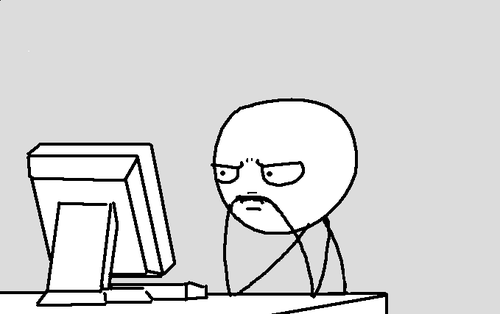Taboo Tropes (Or, Call Me a Vampire Boyfriend and Send Me Into the Dystopian Future Where I Shall be a Demigod)
 We all have our sub-genres and we all know that feeling when someone tells us some other author just got a seven-figure advance for a novel in said sub-genre or when an agent refuses your sub-genre on their webpage. We know that feeling that melts your gut and makes your arms feel cold like when you get a flu injection when you see a novel on Goodreads.com that has rave reviews and falls into your sub-genre just as well as your own work does.
We all have our sub-genres and we all know that feeling when someone tells us some other author just got a seven-figure advance for a novel in said sub-genre or when an agent refuses your sub-genre on their webpage. We know that feeling that melts your gut and makes your arms feel cold like when you get a flu injection when you see a novel on Goodreads.com that has rave reviews and falls into your sub-genre just as well as your own work does.It might not even be that. It might be that you're inspired with what you believe to be an original story that is plaguing your dreams and your waking moments that falls into the sub-genre that was so two minutes ago. You're having a small heart attack when you're not creating this story, because you know that anyone with half a brain would laugh and spit in your face if you proposed this story to them.
Everyone understands this. They can empathise.
But you need to take a step back and have a good think about this.
Almost every bestselling novel, particularly YA, is heavily based on using tropes and using them right. There are the odd exceptions, sure, but for the most part, the NYT Bestseller List is trope-central. The young boy destined to save the world, the perfect other-worldly boyfriend, the the ancient prophecies, the fast-learner protagonist. I mean, whoa.
Sure, we as writers get sick of the vampires, particularly the sparkly ones, and we get sick of glowing swords and wise old mentors. But readers don't. Yes, you hear a lot of them moan and grown at yet another TWILIGHT, but readers buy these books and make the author successful beyond what most of us will ever believe.
I am absolutely not saying that you should write the novels you take because there is a slight chance you might latch onto a market trend. God, don't. The only thing worse than TWILIGHT were the rip-offs that hit the shelves after its success. But think about Cassandra Clare's MORTAL INSTRUMENTS series which has the Darth Vader relationship between its hero and villain and the Luke/Leia relationship between its love interests, worn-out cliches that are made fun of time and time again. All the same, it's a guilty pleasure of mine and it's made that clever woman a nice bed of money to bathe in.
You shouldn't abandon your novel, especially if you're inspired and you're enjoying yourself. You shouldn't. Sure, there's that part of you imagining all the publishers and the agents and the readers going:
But, have faith. For every down, there's usually an up.
Take, for example, a fantasy novel about a young boy with a telepathic link to a dragon that he is fated to ride into battle. Sound familiar? It probably brings to mind a number of other films and novels. But if you were pitching this to a mainstream publisher or an agent, it might help. Being able to say "It's like ERAGON with [insert intriguing twist]" would be beneficial. Think about James Cameron's Avatar and how they changed dragon riding with a psychic link to a physical one and the dragons to more bat-like things and the people to giant blue humanoids. And you weren't think of ERAGON at all when you were watching that.
There is a reason certain stories are popular. You can publish Greek gods to death or dystopias to death but because I personally find the concept fascinating, and I did long before the trends came around, having that on the jacket of a book will make me interested.
You should probably consider that the prevailing theory amongst publishers are the two ends of the spectrum. A) "Tropes don't usually sell, so I'm not going to read past the first paragraph. Form rejection", or B) "Tropes are absolutely great for sales! I'll give it a chance". Your novel doesn't only stand on its tropes, it stands on many other things. Writing, characters, plot, pace, etc.
Originality isn't always a matter of plot, or of writing style necessarily. It can be a matter of a slant or angle that you take. That's why reading beyond your genre and drawing inspiration will lessen the possibility of falling into tropes that are closely linked to your genre.
Then again, originality varies from reader to reader. A voracious readers, including writers, get tired of the same tropes and the same ideas because they read a lot. Someone who reads far less than that, however, will consider something fresh and exciting that makes those voracious readers groan.
I don't want to use the HARRY POTTER card, but I'm going to use it. Someone once said that Rowling found a "new bottle for old wine". Orphan boy is actually super-special and goes to a place where he is revered? You don't remember the series for that. You remember the series for Snape and his hooked nose, for Sirius Black and his older man appeal, for Ron and Hermione's romance, for the people you mourned and the people you grew to love, for the world that Rowling created with the chocolate frogs, and the goblins in the bank and the enormous sewers beneath Hogwarts. HARRY POTTER is magic for a reader in a nutshell, and it's not because of the trope. It's because of the sheer talent of Rowling herself.
So don't stress.
Make your own magic.
There is a balance, tropes for originality, and the latter should outweigh the former. If that balance is tilted, then perhaps you should review what you're doing. But if your basic premise is what's bothering you, then don't be bothered.
Take me, for example? Maybe? My novel is, in its simplest form, about superheroes. Anyone could tell you that there is a reason superhero novels are usually done: they don't translate well into a graphic-less medium. Superhero films are coming out in hordes, as are superhero video games and reboots of old cartoons. Have you seen io9.com and the amount of superhero TV shows that are set for release? I might have a trope, but I have a marketable trope and I am almost certain that my uncostumed team of reunited adolescent heroes beat the taboo of said trope into a comatose state.
So don't worry. There's always a chance. And tropes aren't what you should be obsessing over. You should be obsessing over the quality of your novel.
Unless you have sparkly vampires.
Ahha, yes. So, thoughts?



I love these pictures!
ReplyDeleteI agree with you, too (not because of the pictures). As long as you make the trope somehow new and fresh, you're in the green. Great post :D
Ya, basically I think we should go where inspiration take us. I don't like the idea of people choosing a particular genre/subgenre just because it's popular right now or whatever. They should choose it because they have a passion for it and want to write it!
ReplyDelete